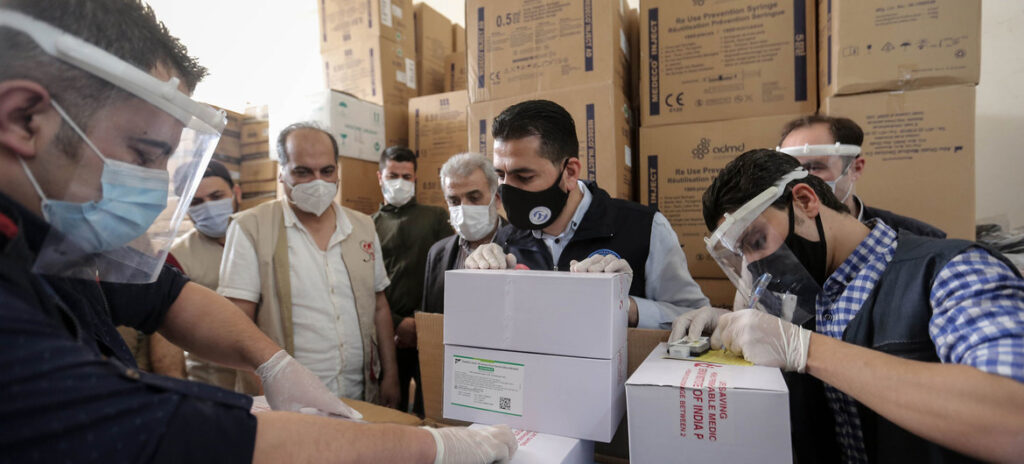Updates & Press
Featured | April 23, 2021
Weekly Humanitarian News Digest – April 23
Author | MedGlobalComms

Each week, we highlight the latest news related to the humanitarian and health crises in our countries of operation: Bangladesh/ Myanmar, Colombia/ Venezuela, Gaza/ Palestinian Territories, Lebanon, Pakistan, Sudan, Syria, and Yemen. For more frequent updates, make sure to follow us on Facebook, Instagram, and Twitter.
Cover Image: UNICEF
Latest News for April 16 – April 23, 2021
Bangladesh/ Myanmar
The UN refugee agency has called on Bangladesh to delay the relocation of Rohingya refugees to Bhasan Char island until improvements to safety are made. Due to the vulnerability of the island to cyclones, UNHCR recommended that the government complete construction on flood embankments, produce emergency management plans for extreme weather events, and create stockpiles of essential supplies before relocating additional refugees. The island currently hosts 18,304 Rohingya refugees. Bangladesh plans to increase the number to 100,000 as part of its plan to reduce overcrowding in the Cox’s Bazar camps. (The Diplomat)
Colombia/ Venezuela
Colombia has implemented new COVID-19 restrictions following the highest number of deaths in a single day since the pandemic began. According to the Ministry of Health, 420 people died in 24 hours, bringing the total number to more than 68,700. Lockdowns and travel restrictions will go into effect in Bogota, where intensive care units are at 86% capacity, as well as 12 regional capitals. Colombia continues to vaccinate its population, but delivery delays and other challenges have hindered the campaign. (Colombia Reports)
Gaza/ Palestinian Territories
According to health officials, intensive care units in Gaza have reached 70% capacity as the area endures another wave of COVID-19 infections. The number of severe and critical cases has risen significantly and the number of deaths has increased 43% over the past week. COVID-19 testing remains limited and the health system lacks the capacity to test for some of the highly transmissible variants. Gaza has received few vaccines and according to a survey by the Jerusalem Media and Communications Center, 54.2% of people in Gaza said they would not take the vaccine. (Al Arabiya News)
Lebanon
Nearly 90% of the one million Syrian refugees in Lebanon are living in extreme poverty. Lebanon’s financial crisis and the COVID-19 pandemic have caused a rapid deterioration in living conditions for the country’s population, but has disproportionately harmed refugees. Half of Syrian refugee families now suffer from food-insecurity, up from 28% in 2019. (Associated Press)
Pakistan
Pakistan’s third wave of COVID-19 infections has resulted in nearly 5,400 new cases per day and the highest number of deaths since the pandemic began. Across the country, health guidelines are often ignored and mass gatherings are common. Pakistan’s vaccination campaign has only reached around 800,000 people, less than 0.2% of the population. Many Pakistanis are afraid of vaccines as a result of conspiracy theories, rumors, and lack of trust in the government. (The Diplomat)
Sudan
The governor of West Darfur has declared its capital, El Geneina, a disaster area following a rise in violent attacks. The governor called on the national government to assist with reconstruction efforts and provide humanitarian aid, shelter, and food to victims. In South Darfur, more than 2,400 families continue to face shortages of shelter, food, and clothes after a massive fire destroyed multiple camps for refugees and displaced persons. (Radio Dabanga)
Oxygen shortages across several regions of Sudan have forced hospitals to transfer patients across state lines. The country’s health system has largely collapsed due to strain caused by the COVID-19 pandemic, violent conflict, and the financial crisis. Medical imports have dropped significantly and 58% of essential medicines are no longer available in Sudan. (Radio Dabanga)
Syria
On Thursday, Syria received more than 250,000 COVID-19 vaccines through the COVAX initiative. The majority of the vaccines were delivered to Damascus, except for 53,000 which were sent directly to the northwest. By the end of 2021, COVAX plans to deliver enough vaccines to cover 20% of the country’s population. The first people to receive vaccines will be health workers, the elderly, and people with underlying conditions. (UN News)
Yemen
On Tuesday, the Yemeni government launched its COVID-19 vaccination campaign with the goal of reaching more than 317,000 people in 12 days. In March, Yemen received 360,000 doses of AstraZeneca through the COVAX program and expects to receive a total of 1.9 million doses by the end of the year. The campaign will cover 13 governorates and prioritize inoculations for frontline health workers, the elderly, and people with chronic conditions. Areas not under the control of the Yemeni government will not be covered by the campaign. The WHO also plans to send 10,000 doses to Sana’a, which is currently controlled by Ansar Allah. (Arab News)


